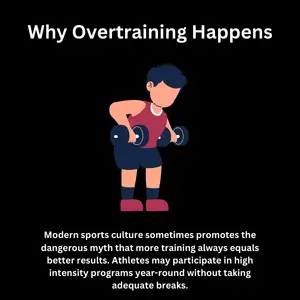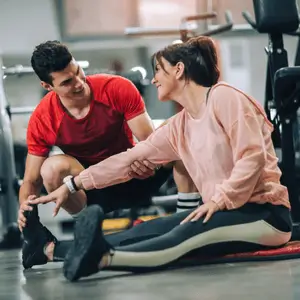Many young athletes in Sunnyvale are pushing hard to excel in sports—but when training goes unchecked, it can actually hurt performance and health. With our community’s strong commitment to youth athletics, from high school varsity teams to competitive club sports, it’s easy for dedicated athletes to cross the line from beneficial training into dangerous territory. The good news is that overtraining syndrome is completely preventable when you know what to watch for.
If you’re a parent or coach noticing your athlete seems more tired or moody than usual, you’re not alone—and you’re absolutely right to pay attention. These observations aren’t signs of weakness or failure; they’re your first line of defense against a condition that affects many athletes, from recreational participants to elite athletes worldwide.
Understanding Overtraining Syndrome: When Too Much Becomes Too Much

Overtraining syndrome occurs when the body repeatedly experiences stress from excessive exercise without adequate rest for full recovery. Unlike normal muscle soreness after a challenging workout, this condition develops gradually as training load exceeds the body’s ability to adapt and repair itself. The physical and mental toll can affect everything from blood pressure and kidney function to mood changes and declining performance.
Think of your young athlete’s body like a smartphone battery. With proper rest periods between training sessions, the battery recharges fully and performs at peak capacity. But when you constantly drain it without allowing complete charging cycles, the battery’s overall performance degrades over time. This is exactly what happens when athletes don’t get proper rest between intense physical activity sessions.
The condition doesn’t discriminate—it can affect any physically active individual who consistently pushes their training intensity or training volume beyond their recovery capacity. What makes it particularly concerning for young athletes is that their developing bodies are already managing the stress of growth, school, and personal life pressures alongside their training regimen.
The Six Critical Warning Signs of Overtraining
1. Declining Athletic Performance Despite Increased Training

The most paradoxical sign of overtraining syndrome is when your athlete exercises harder but performs worse. You might notice slower times, reduced strength, or coordination issues that seem unexplained—common symptoms of this condition. This unexplained underperformance syndrome occurs because the body hasn’t had enough time to adapt to the training stress and rebuild stronger tissues after repeated bouts of intense workouts over a few weeks or more.
Many athletes and coaches mistakenly respond to declining performance by increasing exercise volume or intensity. However, this approach typically worsens the problem, creating a cycle where too much exercise leads to even greater performance drops, weight gain, and other symptoms associated with overtraining syndrome. Consulting a healthcare provider is essential to diagnose overtraining syndrome and begin recovery, as continuing without proper guidance may prolong overtraining syndrome and its negative impact.
2. Persistent Fatigue and Chronic Exhaustion
When adequate rest fails to restore your athlete’s energy levels, chronic fatigue may be setting in—a telltale sign of overtraining syndrome. This isn’t the normal tiredness after a single workout program—it’s a deep exhaustion that doesn’t improve with sleep. Athletes experiencing this often report feeling tired before they even begin simple daily activities, highlighting the subtle difference between regular fatigue and the symptoms of something more serious.
The overall fatigue extends beyond symptoms to include chronic conditions like confusion, inability to concentrate, and mental fogginess. This happens because stress hormone levels remain elevated, disrupting normal sleep patterns and recovery processes that are essential for both physical and mental health. A healthcare provider can help determine whether this fatigue is caused by overtraining syndrome, underlying health conditions, or a combination of both.
3. Increased Frequency of Overuse Injuries
One of the clearest physical signs of overtraining syndrome is when minor injuries become frequent visitors. Stress fractures, muscle sprains, shin splints, and joint injuries start appearing more often as the body’s repair mechanisms fall behind the damage accumulating from exercise sessions. These overuse injuries develop because tissues don’t have sufficient recovery time between exercise and are classic symptoms of an imbalanced training plan.
Young athletes might experience muscle fatigue that persists longer than normal, or muscle soreness that doesn’t respond to typical recovery methods like sports massage or gentle exercise. When the body repeatedly faces stress without rest, even small movements can trigger discomfort or injury. Consulting a sports psychologist can help assess not just physical strain but other factors affecting motivation, mindset, and performance levels, all of which may be compromised by overtraining syndrome and exercise without rest.
4. Frequent Upper Respiratory Tract Infections and Illness
A compromised immune system is one of the body’s first responses to excess stress from overtraining syndrome. Athletes may notice they’re catching colds more frequently or that respiratory tract infections linger longer than usual. This happens because prolonged elevated stress levels from exercise suppress immune function, making the body more vulnerable to illness—a common cluster of symptoms that warrant attention.
Some athletes also experience changes in their menstrual cycle or irregular menstrual cycles, which can indicate hormonal disruptions caused by excessive stress and exercise intensity. Elevated creatine kinase levels, often seen in lab tests, can point to muscle breakdown beyond what occurs during functional overreaching, which is temporary and recoverable. These changes in overall health are the body’s way of signaling that it needs an extended break from intense exercise. If symptoms persist, the best course of action is to consult a healthcare provider, as more research is still being done to understand how overtraining syndrome affects immune response and long-term wellness.
5. Significant Mood and Behavioral Changes
Mental health is deeply connected to physical training, and overtraining syndrome often manifests through personality changes. Previously motivated athletes may show decreased enthusiasm for their sport, increased irritability, or signs of depression and anxiety. These mood changes aren’t character flaws—they’re legitimate exercise related symptoms that require attention.
Parents in Sunnyvale often notice their typically energetic teens becoming withdrawn or losing interest in activities they once loved. These behavioral shifts can strain family relationships and academic performance, making it crucial to address the underlying imbalance rather than dismissing these changes as typical teenage behavior.
6. Loss of Motivation and Passion for Sport
Perhaps the most heartbreaking sign is when a young athlete who once lived and breathed their sport suddenly loses interest. They might start making excuses to skip training, express feelings of burnout, or talk about quitting altogether. This motivational decline often accompanies other physical symptoms but can be the most emotionally challenging for families to witness.
The loss of passion isn’t permanent, but it requires immediate intervention to prevent overtraining syndrome from causing long-term damage to the athlete’s relationship with physical activity and competitive sports.
Why Overtraining Happens: The Perfect Storm

With many Sunnyvale teens juggling school sports, club practices, and private training, it’s easy for physical and mental fatigue to build quietly over time. The combination of academic pressure, social expectations, and athletic ambitions creates excess stress that compounds the physical demands of training. Young athletes often feel pressure to never miss a workout, viewing rest days as signs of weakness rather than essential components of their fitness routine.
Modern sports culture sometimes promotes the dangerous myth that more training always equals better results. Athletes may participate in high intensity programs year-round without taking adequate breaks, or they might add resistance training, HIIT workouts, and additional exercise sessions to their already packed schedules. This “more is better” mentality ignores the fundamental principle that adaptation and growth occur during rest, not during the session itself.
Nutritional factors also play a crucial role in the development of overtraining syndrome. Young athletes experiencing rapid growth need enough calories to fuel both their development and their demands. When calorie intake doesn’t match energy expenditure, the body begins breaking down muscle tissue and compromising recovery processes. Some athletes may also develop iron deficiency, which can worsen fatigue and impact their body’s ability to transport oxygen effectively.
Environmental and social stressors compound the problem. Academic deadlines, college recruitment pressure, family expectations, and peer competition all contribute to elevated stress levels that affect recovery. When life stress combines with training stress, the risk of developing overtraining syndrome increases dramatically.
What Parents and Coaches Can Do: Prevention and Recovery Strategies

The most effective approach to treat overtraining syndrome begins with prevention. Creating a balanced training program that includes planned rest periods and active recovery sessions gives young athletes’ bodies time to adapt and grow stronger. This means scheduling complete rest days and lighter training weeks throughout the season, not just during off-season periods, which is a key strategy to avoid overtraining which can lead to long-term symptoms.
Establishing open communication with your athlete is essential for early detection of warning signs. Regular check-ins about energy levels, mood, and perceived exertion can help identify symptoms before they become severe. Keeping a training log that tracks not only workouts but also sleep quality, stress levels, and physical symptoms provides a practical guide to your athlete’s overall condition, especially when used to monitor the effects of intense exercise.
When signs of overtraining appear, the first step is often reducing training intensity and volume rather than stopping training completely. Gentle exercise and active recovery activities like walking, yoga, or easy swimming can help maintain fitness while allowing recovery. However, severe cases may require an extended break from formal training to allow full recovery of both physical and mental systems—since pushing through may cause more harm or lead to complications that require special surgery if left unaddressed. Recognizing and treating these symptoms early is crucial to protect your athlete’s long-term health.
Working with a mental health professional can be valuable when overtraining affects an athlete’s psychological well-being. These experts can help young athletes develop healthy coping strategies and maintain perspective about their sport and personal goals. Similarly, consulting with health professionals ensures that any underlying medical issues like hormonal imbalances or nutritional deficiencies are properly addressed.
Regular blood tests can help monitor markers of recovery and overall health, including indicators of kidney function and iron levels. Some athletes benefit from tracking additional metrics like resting heart rate and blood pressure, which can provide early warning signs of developing overtraining syndrome.
To prevent overtraining syndrome from recurring, focus on creating sustainable training habits that prioritize long-term athletic development over short-term gains. This includes teaching young athletes to listen to their bodies, respect the need for rest, and understand that recovery is not optional—it’s a critical component of any successful training regimen.
Empowering Healthy Athletic Futures
Recognizing the signs of overtraining isn’t about limiting your young athlete’s potential—it’s about protecting their ability to pursue their athletic dreams for years to come. Early intervention leads to faster recovery and helps establish healthy training patterns that will serve them throughout their athletic careers. The goal is sustainable performance improvement, not quick fixes that compromise long-term health.
At our clinic here, we work with young athletes and their families to restore balance and strength—before symptoms and injuries set them back. Our team understands the unique pressures facing local student-athletes and can provide personalized strategies to avoid excess fatigue while maintaining competitive performance.
Remember that every competitive athlete, from weekend warriors to Olympic champions, faces the challenge of balancing training stress with recovery needs. Teaching young athletes to respect this balance early in their careers sets them up for lifelong success and enjoyment in physical activity.
If you’re concerned your child might be experiencing overtraining syndrome, don’t wait for the problem to resolve itself. Schedule a consultation with our sports health team to develop a recovery plan that gets your athlete back to peak performance safely and sustainably. Together, we can ensure that your young athlete’s passion for sport remains a source of joy, growth, and achievement for years to come.


